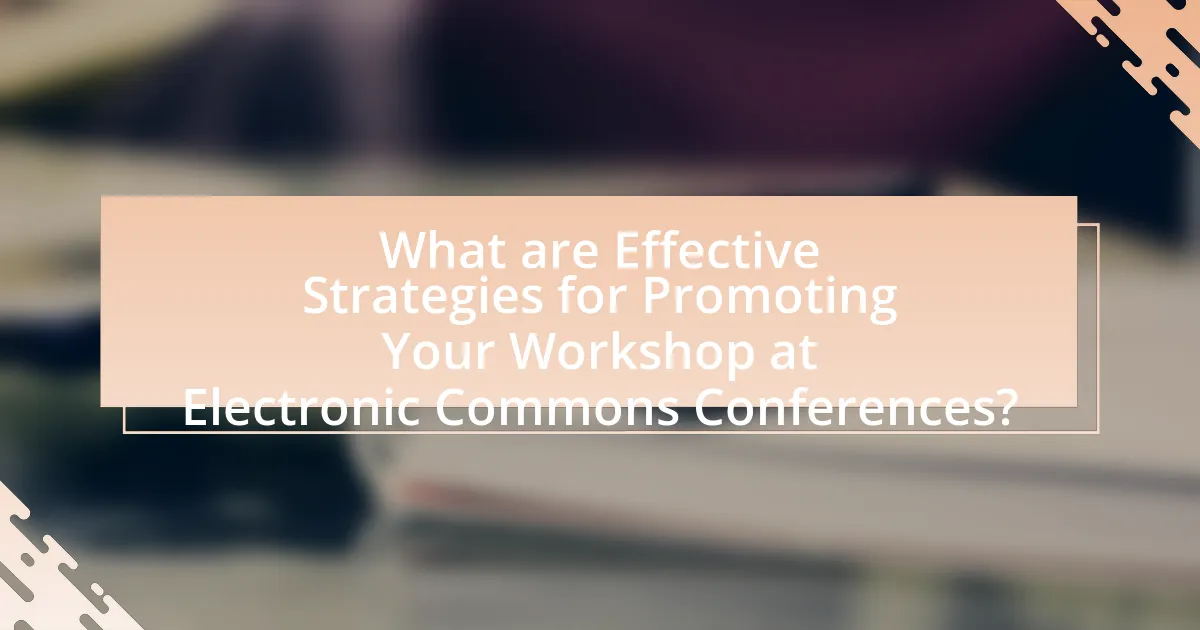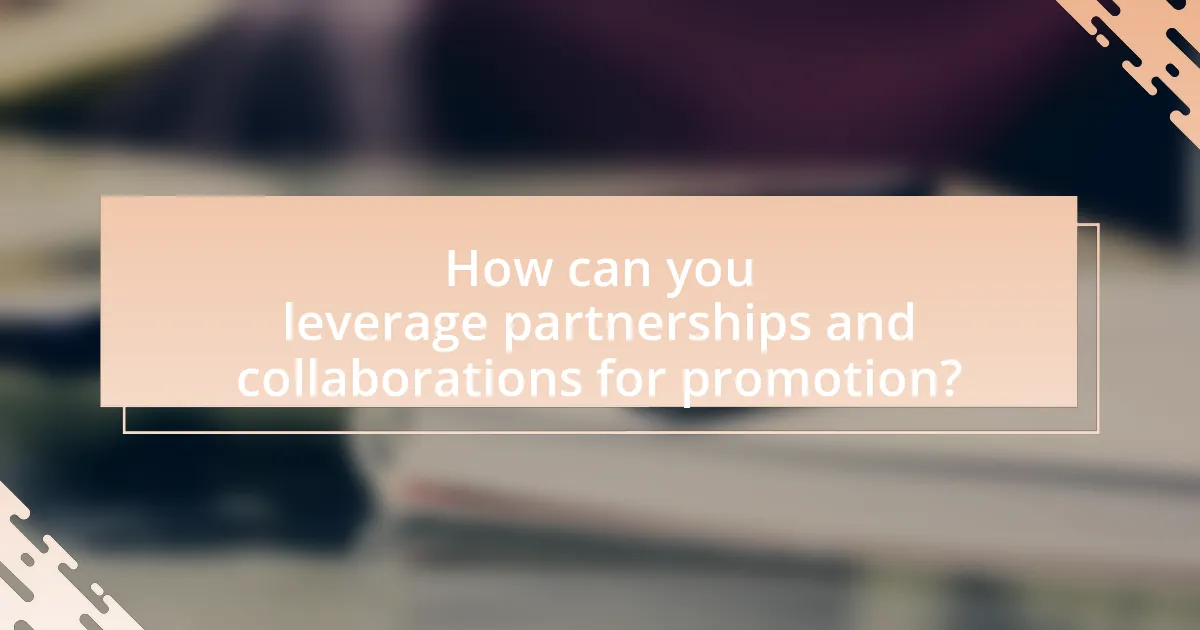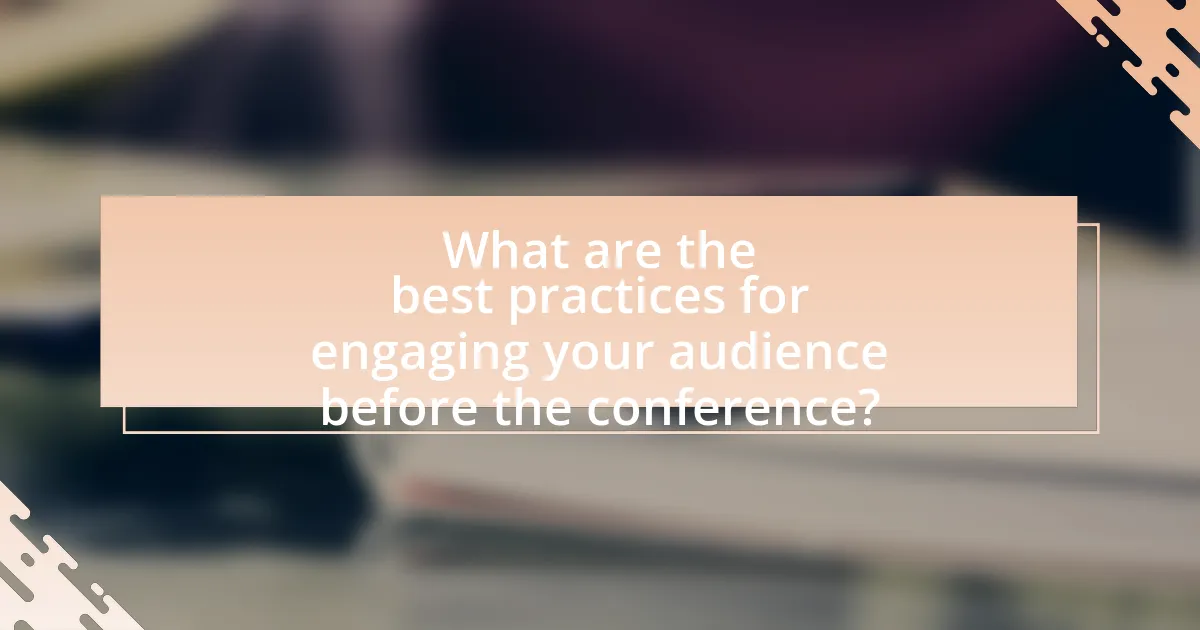The article focuses on effective strategies for promoting workshops at Electronic Commons Conferences. It outlines key methods such as leveraging social media, engaging with relevant communities, and utilizing email marketing to enhance visibility and attendance. The article emphasizes the importance of identifying target audiences through demographic analysis and tailoring promotional content accordingly. Additionally, it discusses the role of partnerships, testimonials, and interactive content in boosting engagement before and after the event, as well as best practices for maintaining participant interest and gathering feedback for future improvements.

What are Effective Strategies for Promoting Your Workshop at Electronic Commons Conferences?
Effective strategies for promoting your workshop at Electronic Commons Conferences include leveraging social media, engaging with relevant communities, and utilizing email marketing. Social media platforms like Twitter and LinkedIn allow for targeted outreach to potential attendees, increasing visibility and engagement. Engaging with communities, such as academic forums or interest groups related to your workshop topic, can foster interest and encourage word-of-mouth promotion. Email marketing, particularly to previous attendees or interested parties, can provide direct communication about the workshop’s value and details, leading to higher registration rates. These strategies are supported by research indicating that targeted outreach significantly enhances event attendance and participant engagement.
How can you identify your target audience for the workshop?
To identify your target audience for the workshop, conduct thorough market research to understand the demographics, interests, and needs of potential participants. This involves analyzing existing data on similar workshops, surveying past attendees, and utilizing social media analytics to gauge engagement and preferences. For instance, a study by the American Marketing Association found that 70% of successful workshops tailored their content based on audience feedback and demographic insights, demonstrating the effectiveness of targeted audience identification.
What demographics should you consider when defining your audience?
When defining your audience, consider demographics such as age, gender, income level, education, geographic location, and occupation. These factors significantly influence preferences and behaviors, allowing for targeted messaging. For instance, a study by Pew Research Center indicates that age groups exhibit distinct online engagement patterns, with younger audiences favoring social media platforms while older demographics may prefer email communication. Understanding these demographics enables more effective promotion strategies tailored to the specific characteristics and needs of the audience.
How does understanding your audience influence your promotional strategies?
Understanding your audience significantly influences promotional strategies by enabling tailored messaging that resonates with specific demographics. When marketers analyze audience characteristics such as age, interests, and professional backgrounds, they can create targeted campaigns that address the unique needs and preferences of those groups. For instance, research from the Content Marketing Institute indicates that 70% of consumers prefer personalized content, which demonstrates that audience understanding leads to higher engagement rates. Consequently, effective promotional strategies that align with audience insights can enhance participation and interest in workshops at Electronic Commons Conferences.
What platforms are best for promoting your workshop?
Social media platforms such as Facebook, Instagram, and LinkedIn are best for promoting your workshop. These platforms allow for targeted advertising, enabling you to reach specific demographics interested in your workshop’s subject matter. For instance, Facebook has over 2.8 billion monthly active users, providing a vast audience for event promotion. Additionally, LinkedIn is particularly effective for professional workshops, as it connects you with industry professionals and organizations. Using these platforms can significantly increase visibility and attendance for your workshop.
Which social media channels are most effective for outreach?
The most effective social media channels for outreach are Facebook, Twitter, and LinkedIn. Facebook offers extensive reach and targeted advertising options, making it ideal for engaging diverse audiences. Twitter facilitates real-time communication and updates, which is beneficial for event promotion and engagement. LinkedIn is particularly effective for professional outreach, allowing for targeted connections within specific industries. According to a 2021 report by Hootsuite, 73% of marketers believe that social media marketing has been effective for their business, highlighting the importance of these platforms in outreach strategies.
How can email marketing enhance your workshop promotion?
Email marketing can enhance workshop promotion by directly reaching a targeted audience, increasing engagement, and driving registrations. By utilizing segmented email lists, organizers can tailor messages to specific demographics, ensuring that the content resonates with recipients. According to a study by the Direct Marketing Association, email marketing has an average return on investment of $42 for every dollar spent, demonstrating its effectiveness in generating interest and conversions. Additionally, personalized emails can lead to higher open and click-through rates, further amplifying the promotional efforts for workshops.
What role does content play in workshop promotion?
Content plays a crucial role in workshop promotion by effectively communicating the value and relevance of the workshop to potential attendees. High-quality content, such as engaging descriptions, informative blog posts, and targeted social media updates, helps to attract interest and generate excitement around the event. For instance, a study by HubSpot found that content marketing generates three times more leads than traditional marketing methods, highlighting the importance of well-crafted content in reaching and engaging the target audience. Additionally, clear and compelling content can enhance the workshop’s visibility in search engines, making it easier for interested participants to find and register for the event.
How can you create engaging promotional materials?
To create engaging promotional materials, focus on clear messaging, visually appealing design, and targeted content. Clear messaging ensures that the audience understands the value of the workshop, while visually appealing design captures attention and enhances retention. Targeted content, tailored to the specific interests of the audience, increases relevance and engagement. Research indicates that materials with strong visuals can increase information retention by up to 65%, highlighting the importance of design in promotional efforts.
What types of content resonate most with potential attendees?
Engaging and informative content types that resonate most with potential attendees include interactive workshops, expert-led sessions, and case studies. Interactive workshops allow participants to actively engage with the material, fostering a hands-on learning experience that enhances retention. Expert-led sessions provide valuable insights and credibility, as attendees often seek knowledge from recognized authorities in their fields. Additionally, case studies illustrate real-world applications and success stories, making the content relatable and practical. Research indicates that 70% of attendees prefer sessions that involve active participation, highlighting the effectiveness of these content types in attracting interest and enhancing attendee experience.

How can you leverage partnerships and collaborations for promotion?
You can leverage partnerships and collaborations for promotion by aligning with organizations or individuals that share a similar audience or mission. This strategy enhances visibility and credibility, as partners can amplify your message through their networks. For instance, co-hosting events or cross-promoting content can lead to increased engagement; research shows that collaborative marketing can boost reach by up to 50%. Additionally, partnerships can provide access to resources and expertise that enhance the quality of your promotional efforts, making them more effective.
What organizations or individuals can you collaborate with?
You can collaborate with academic institutions, technology companies, and professional associations relevant to your workshop’s theme. Academic institutions often seek partnerships for knowledge exchange and can provide access to a targeted audience. Technology companies may offer sponsorship or resources, enhancing the workshop’s credibility and reach. Professional associations can help promote the event through their networks, increasing visibility among potential attendees. Collaborating with these entities can significantly enhance the effectiveness of your promotional strategies at Electronic Commons Conferences.
How can partnerships expand your reach and visibility?
Partnerships can expand your reach and visibility by leveraging the networks and audiences of collaborating organizations. When two or more entities join forces, they can share resources, marketing channels, and promotional efforts, which amplifies their collective presence. For instance, a study by the Harvard Business Review found that strategic partnerships can increase brand awareness by up to 50% due to cross-promotion and access to new customer segments. This collaborative approach not only enhances visibility but also fosters credibility, as audiences often trust recommendations from familiar sources.
What are the benefits of co-hosting with other experts?
Co-hosting with other experts enhances credibility and expands audience reach. When multiple knowledgeable individuals collaborate, they collectively attract a diverse group of participants, leveraging each other’s networks and expertise. This collaboration can lead to increased engagement, as attendees benefit from varied perspectives and insights. Additionally, co-hosting can reduce the workload for each expert, allowing for a more efficient planning process and a richer workshop experience. Research indicates that events featuring multiple speakers often see higher attendance rates, as participants are drawn to the combined expertise and the opportunity for comprehensive discussions.
How can you utilize testimonials and past success stories?
Utilizing testimonials and past success stories can significantly enhance the credibility and appeal of your workshop at Electronic Commons Conferences. By showcasing positive feedback from previous participants, you can build trust and demonstrate the value of your workshop. For instance, including specific quotes from attendees about how the workshop improved their skills or knowledge can create a compelling narrative. Additionally, presenting measurable outcomes, such as percentage increases in participant satisfaction or skill acquisition, can provide concrete evidence of your workshop’s effectiveness. This approach not only attracts potential attendees but also reinforces the perceived quality of your offering.
What formats work best for showcasing testimonials?
Video testimonials work best for showcasing testimonials due to their engaging and authentic nature. Research indicates that video content can increase conversion rates by up to 80%, as it allows potential attendees to see and hear real experiences, fostering trust. Additionally, written testimonials, particularly those accompanied by images of the individuals providing them, also prove effective, as they can be easily shared across various platforms and provide a quick reference for credibility. Combining these formats enhances visibility and impact, making them optimal choices for promoting workshops at Electronic Commons Conferences.
How can success stories enhance credibility and attract attendees?
Success stories enhance credibility and attract attendees by providing tangible evidence of past achievements and positive outcomes. When potential attendees see documented experiences of others who have benefited from similar workshops, it builds trust and validates the effectiveness of the event. For instance, a study by the Content Marketing Institute found that 70% of consumers prefer to learn about a company through articles rather than ads, indicating that real-life examples resonate more with audiences. This connection not only boosts the perceived value of the workshop but also encourages individuals to participate, knowing that others have successfully gained insights or skills from it.

What are the best practices for engaging your audience before the conference?
To effectively engage your audience before the conference, utilize targeted communication strategies such as personalized email invitations, social media promotion, and interactive content. Personalized email invitations increase open rates by 29% and click-through rates by 41%, as reported by Campaign Monitor. Social media promotion allows for real-time interaction and sharing, fostering a sense of community among attendees. Additionally, creating interactive content, such as polls or quizzes related to the conference topics, can stimulate interest and encourage participation. These practices not only build anticipation but also enhance attendee commitment to the event.
How can you create anticipation for your workshop?
To create anticipation for your workshop, utilize targeted marketing strategies that engage your audience. Start by crafting compelling promotional materials that highlight the unique benefits and learning outcomes of your workshop, ensuring they resonate with the interests of your target demographic. Research shows that workshops with clear value propositions attract more participants; for instance, a study by the American Society for Training and Development found that 70% of attendees are more likely to register when they perceive a direct benefit to their professional development. Additionally, leveraging social media platforms to share teasers, testimonials, and behind-the-scenes content can build excitement and foster community engagement prior to the event.
What strategies can you use to keep potential attendees informed?
To keep potential attendees informed, utilize multiple communication channels such as email newsletters, social media updates, and dedicated event websites. Email newsletters can provide regular updates about the workshop, including key dates, speakers, and topics, ensuring that interested individuals receive timely information directly in their inboxes. Social media platforms allow for real-time engagement and sharing of content, which can increase visibility and encourage discussions among potential attendees. A dedicated event website serves as a centralized hub for all relevant information, including registration details, schedules, and FAQs, making it easy for attendees to access everything they need in one place. These strategies are effective as they cater to different preferences for information consumption, thereby maximizing outreach and engagement.
How can interactive content boost engagement prior to the event?
Interactive content can significantly boost engagement prior to the event by actively involving potential attendees in the experience. This type of content, such as polls, quizzes, and interactive videos, encourages participation and fosters a sense of community among participants. According to a study by Demand Metric, interactive content generates twice the engagement of static content, as it invites users to contribute their opinions and preferences, making them feel more invested in the upcoming event. By utilizing interactive elements, organizers can create anticipation and excitement, leading to higher attendance rates and a more engaged audience.
What follow-up strategies should you implement after the conference?
After the conference, implement follow-up strategies such as sending personalized thank-you emails to attendees, sharing key takeaways and resources from your workshop, and connecting on social media platforms. Personalized thank-you emails foster relationships and encourage future engagement, while sharing resources reinforces the value of your workshop. According to a study by the Event Marketing Institute, 84% of attendees appreciate post-event communication, highlighting its effectiveness in maintaining interest and building community. Additionally, connecting on social media can enhance visibility and facilitate ongoing discussions about your workshop topics.
How can you gather feedback from attendees to improve future workshops?
To gather feedback from attendees to improve future workshops, implement post-workshop surveys that include both quantitative and qualitative questions. Research indicates that surveys can yield valuable insights; for instance, a study by the American Society for Training and Development found that 70% of organizations use surveys to assess training effectiveness. Additionally, conducting follow-up interviews with a select group of participants can provide deeper insights into their experiences and suggestions for improvement. This combination of methods ensures comprehensive feedback that can directly inform enhancements for future workshops.
What methods can you use to maintain engagement with participants post-event?
To maintain engagement with participants post-event, utilize follow-up emails, social media interactions, and exclusive content sharing. Follow-up emails can provide a summary of the event, key takeaways, and additional resources, which reinforces the value of the experience. Engaging participants on social media platforms encourages ongoing discussions and community building, fostering a sense of belonging. Sharing exclusive content, such as recorded sessions or supplementary materials, keeps participants connected and invested in the subject matter. Research indicates that consistent communication can enhance participant retention and satisfaction, as evidenced by a study from the Journal of Marketing Research, which found that post-event engagement strategies significantly increase participant loyalty and future attendance.
What are some practical tips for successful workshop promotion?
To successfully promote a workshop, utilize targeted marketing strategies that engage your audience effectively. Start by identifying your target demographic and tailoring your messaging to address their specific interests and needs. Leverage social media platforms, such as Facebook and LinkedIn, to create event pages and share engaging content that highlights the workshop’s value. Email marketing can also be effective; send personalized invitations to your mailing list, emphasizing key benefits and early registration incentives. Collaborating with influencers or industry leaders can expand your reach, as their endorsement can attract more participants. Additionally, consider offering early bird discounts or group rates to encourage sign-ups. According to a study by Eventbrite, events that utilize social media for promotion see a 20% increase in attendance, underscoring the importance of a multi-channel approach.